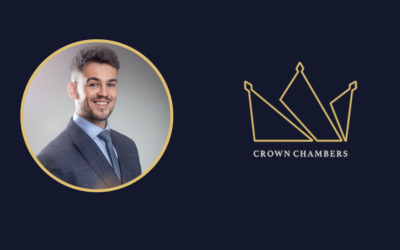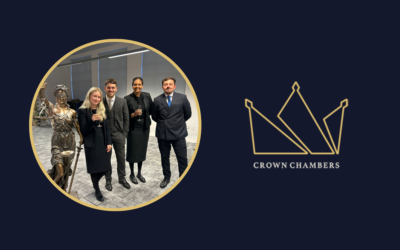Barring the way
As a New Year kicks into full flow, eager pupillage applicants forensically research different chambers, pour-over social-media accounts, and draft answers to application questions, for some there will be the lingering thought – ‘Am I the right person for the Bar?’. Sadly for some minority groups, that question can be harder to answer more positively than it should be. My piece shall summarise how the historically troubled relationship between the LGBTQ+ community and the judicial system acts as a hurdle to LGBTQ+ individuals becoming barristers, and how the Bar, and its members, are either helping or hindering the LGBTQ+ community in this struggle.
You may ask why it is that minority representation matters. Every day the Bar represents LGBTQ+ people whether as claimants, respondents, defendants, complainants, or witnesses to name but some of the options. These individuals are thrown into a world they do not understand; most just desperate to have their stories heard. For these people, there will be some comfort in knowing that the judicial system and the advocate that is set to represent them, understand them, and accepts them. That there is no need for them to be ashamed of their identity or relationships, and to be reassured that they and their case will be treated the same as their heterosexual friends’ and families would. In essence, a justice system that represents all of society is a fairer justice system. Representation of minority groups matters because it gives those individuals in those groups the faith that they can access and receive equal justice too.
There is a long and fraught history between LGBTQ+ individuals and the judicial system, and a short piece like this cannot do justice to the struggle of the generations that came before us on whose shoulders we currently stand. For decades the LGBTQ+ community was targeted, attacked, and treated as second class citizens with unequal rights. Those injustices were argued and applied in the very justice system that LGBTQ+ applicants are currently applying to enter. Being LGBTQ+ at the Bar is knowing that the system was not designed for you: that the inclusion of people like you was an afterthought. An act of progressive action. The first barrier to entry is the knowledge that you are applying to enter a world that spent decades prosecuting people like you.
To help remedy these decades of systemic inequality and discrimination, the Bar and the Inns of Court have worked actively toward encouraging open discussions and promoting LGBTQ+ concerns. Through LGBTQ+ awareness training put on by the Inns as part of their qualifying sessions and the spotlighting of prominent LGBTQ+ practitioners, there is clear evidence that the profession is attempting to right the systemic wrongs of the past and make the profession an inclusive environment for practitioners of all backgrounds. It is heartening to see such strides and both chambers and Inns should be championed for these actions.
At the street level, chambers, such as Crown are actively involved in working towards improving diversity at the Bar, facilitating open discourse and the sharing of lived experiences. Actively encouraging community outreach and education to make advocates aware of the variety of personal experiences and identities they are likely to encounter in clients and colleagues. Chambers from across the circuits have been noted to celebrate the diverse group of barristers working and the efforts they have taken to promote equal opportunities at the Bar. At the grassroots level, it is reassuring to see that chambers across the country are listening and taking action to make the Bar a more representative place.
Despite these positive steps there is still work to be done. Social media gives a voice to every individual and sadly there are recent examples of senior members of the Bar using their social media accounts to actively share transphobic and homophobic statements. Whether these are their own ignorant and poorly researched personal opinions or the endorsement of organisations who openly minimise and attack minority groups. These comments only serve to remind LGBTQ+ members why the upper echelons of the Bar seem so unobtainable and remain non-representative. It can be painfully clear that those we are meant to aspire towards openly hold us in disdain. One’s mind wanders to the LGBTQ+ student considering if the Bar is a safe or open profession to them, or the client who is concerned about whether their barrister will actually stand up for them and represent them as the person they are, not the person that barrister incorrectly and ignorantly believes them to be. Social media is a double-edged sword, and sadly it is one that some members of the Bar are too comfortable wielding against minority groups without any fear of repercussions or consequences. The Bar is a collective, and when some of the profession’s most historically oppressed individuals are publicly targeted or pilloried it is simply not enough that their colleagues stay silent.
Finally, the systemic changes from the Inns must be continued. The concern is that progress is a pendulum and that the positive steps taken by the Inns will swing the other way. Already an evening set aside to celebrate diversity and equality for LGBTQ+ hosted by Middle Temple attracted warranted criticism when it was readvertised as a debate with LGBTQ+ and specifically issues around trans identity as one of the talking points. A blunt reminder that our existence is still subject to debate. This was reinforced on social media when senior members of the Bar openly criticised junior and minority members of the profession who voiced their opposition to the Inn’s changes with suggestions that if they did not like debating, they were in the wrong job. The logic being, that if you do not actively enjoy participating in the ongoing debate of your own existence, the Bar is not for you. Though these posts can be (and in some cases were) deleted, the damage is done, and echoes of the sentiment remain. Those posts were visible on and amplified across public forums where they painted a bleak picture of our profession, who knows how many saw them, and quite how damaging to our reputation they were. We must do better.
Equality before the law matters and this is only achieved by having a legal profession that understands the complexities of the people that it represents. Furthermore, it is in the best interests of the profession to ensure that minority groups are represented and heard. The positive systemic changes and the day-to-day enthusiasm and support of chambers like Crown goes a long way, but there is still a great distance for our profession as a whole to travel. It is important for members of the Bar to support and encourage those who need it, and to criticise loudly and collectively those who seek to spread division and bar the way for minority groups. To show that the Bar can be a place for everyone, advocating fairly for anyone.
Harry Bradford – Pupil Barrister
Crown Chambers



